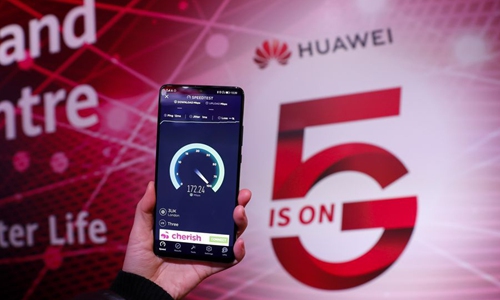Huawei not a 'China First' case to be confused with 'America First'
By Ai Jun Source: Global Times Published: 2020/7/20 20:08:40

A staff member tests the speed with a Huawei 5G mobile phone at Huawei 5G Innovation and Experience Center in London, Britain, on Jan. 28, 2020. Photo: Xinhua
Constanze Stelzenmüller, a senior fellow at Brookings Institution, published an article in the Financial Times Friday titled "Europe faces a fateful choice on Huawei," suggesting "Beijing's China First policies require a firm, principled European response."Why "fateful?" What are the "China First policies?" No explicit clarification was available. On the contrary, the author proved one thing: Mounting pressure from the US has made Europe suffocate, and the latter has to pick a side - the US' side.
"For months, most EU countries hid behind the UK" over the issue of whether to cooperate with Chinese tech giant Huawei, and hoped they could "have it both ways: get a swift, cost-efficient cellular telephony upgrade from China, while avoiding trouble with their US ally," Stelzenmüller wrote. But after the UK made the decision on July 14 to block Huawei, "Europeans find themselves deprived of cover," she claimed.
It is queer how she went from there to "China First policies" or the so-called threat posed by Beijing. Isn't the real question Europe should ask itself, "Who deprived Europe of the cover?"
Chinese netizens have questioned why Beijing can't promote "China First policies." It's reasonable for any government to put its country's development and interests first. The problem is Western media outlets and observers, who are brainwashed by the US-style "America First" approach, tend to smear everything China does, be it safeguarding its territorial sovereignty and national security, or doing business with other countries, as China's aggressive pursuit of hegemony.
But has China taken protectionist measures or coerced other countries to make trade concessions? Has China walked away from its global obligations and responsibility, tore apart international agreements or withdrawn from international organizations just because it is not satisfied with the amount of interests it gained from them? Has China turned its back on international morality as has the US, which launched a worldwide trade war and pressured its allies on issues from defense budget to TikTok?
The argument is false that Beijing is promoting "China First policies" through Huawei's case. Whether or not European countries select Huawei technology is supposed to be an issue of fair trade. Unfortunately, it has now become a matter of geopolitical competition, thanks to constant US political and ideological attacks against the company. The farce is all about US resistance to any non-American companies, especially those from China, to take the lead in high technology. Washington rejects Huawei's success in 5G, and is thus resorting to every possible means to crack down on it, including coercing its allies to do the same.
Take the UK's 5G ban. Reports show Huawei was told by the British government privately that "geopolitical" factors were behind the country's latest decision, with hints that things could be reversed after the US presidential elections in November.
The real puzzle facing Europe is not the fictional "China First," but real "America First." The US is playing a shrewd game. It seems to have been talking about security issues with Europe, yet it is asking Brussels to dance to Washington's pipe over an increasing number of issues, with security assurance as a bargaining chip. But will the US realize a fair trade-off? Europe should not be naïve.
The UK's choice on Huawei was not made under pressure from China, nor will London or Brussels face coercion from Beijing. If Europe does face a fateful choice, it would be how to figure out who its real partner is and who a toxic friend is.
Posted in: OBSERVER